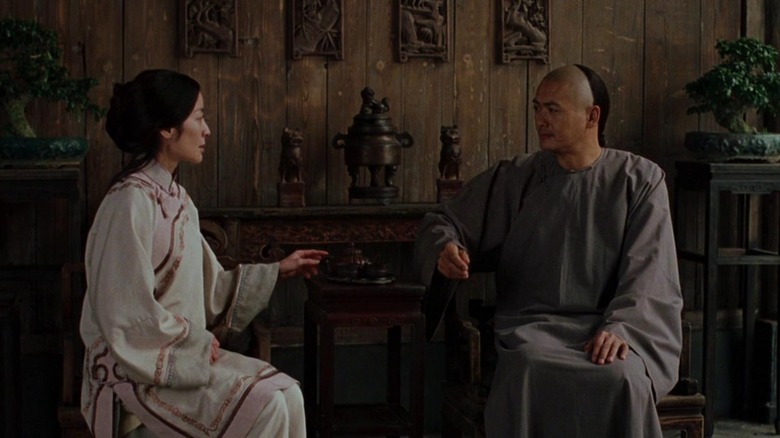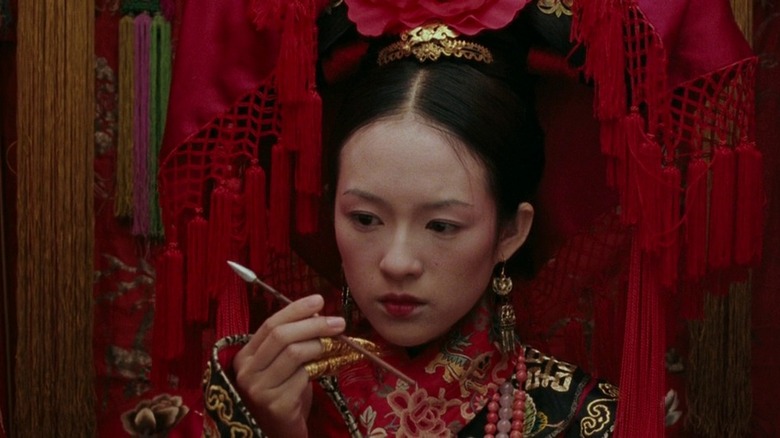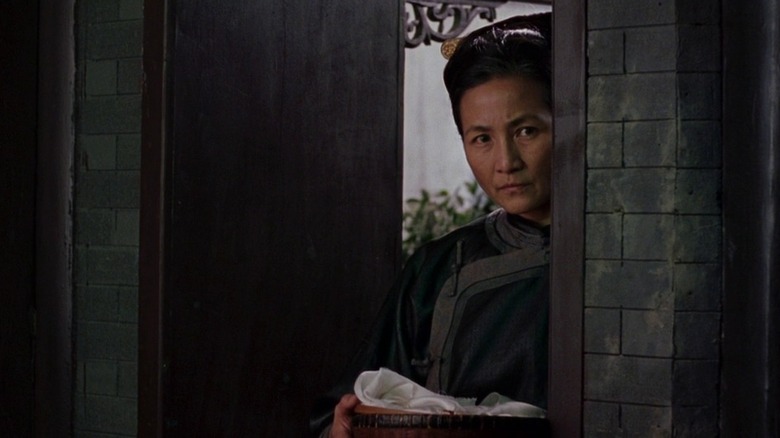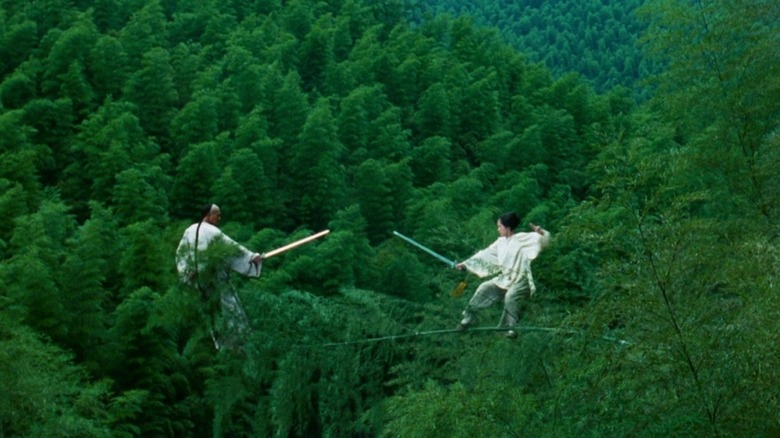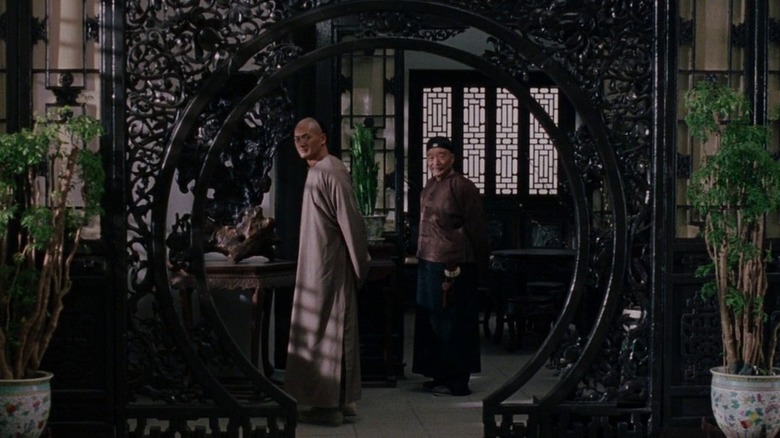Ang Lee Made Crouching Tiger, Hidden Dragon A Masterclass In Compromise
"Crouching Tiger, Hidden Dragon" has all the trappings of a great wuxia film. Loosely adapted from a series of novels by Wang Dulu, the movie features a legendary sword, doomed lovers, and martial arts duels. Martial arts legend Cheng Pei-pei stars alongside Michelle Yeoh. The film's famous bamboo forest battle even pays direct homage to the genre classic "A Touch of Zen." On its release, "Crouching Tiger, Hidden Dragon" became the single highest grossing foreign-language film in the history of the United States. It was nominated for several Oscars and won four, including Best Foreign Language Film. Its success paved the way for the smaller but still meaningful breakthrough of fellow martial arts film "Hero" and its successor, "House of Flying Daggers."
Yet there's something slippery about "Crouching Tiger, Hidden Dragon" despite its bona fides. The film was critiqued by Chinese audiences as being too rote and not authentic enough. The cast members speak their lines in Mandarin, but with completely different accents due to their differing backgrounds. As a director, Ang Lee was ambitious in his demands despite being a novice at directing action films. The pacing suffers due to Lee's dedication to spelling out, via minutely detailed acting, beats that filmmakers in Hong Kong and Taiwan had long conveyed through shorthand. But Lee wouldn't have it any other way. In an interview with Entertainment Weekly, he addressed the challenge: "I bent [the genre]. I think that's the real difficulty. Like, 'You want to fight ... or you want to do drama?" His response: "I wanted it all."
Sense and sensibility
Ang Lee's first great successes were the "Father Knows Best" trilogy, beginning with "Pushing Hands" in 1991. These were comedy-dramas that directly explored familial contradictions in both the United States and Taiwan. His later films made in Hollywood, "Sense and Sensibility" and "The Ice Storm," further established his reputation as a master of portraying interpersonal relationships on screen. An action film like "Crouching Tiger, Hidden Dragon" was outside his personal experience and his skill-set. But Lee wanted to do it, to fulfill a childhood dream. This meant calling in the experts. One was Yuen Woo-ping, a director and choreographer famed for Hong Kong action films like "Drunken Master" and "Iron Monkey." His work made the careers of stars like Jackie Chan and Donnie Yen. He was exactly the kind of experienced hand Lee needed to fulfill his ambitions.
At the same time, Lee had his own ideas. "Crouching Tiger, Hidden Dragon" would be an action movie, but he also wanted there to be acting at the same level of quality as "Sense and Sensibility." His cast were clearly capable of it. All the crew had to do, he believed, was to give the faces of the actors the same attention as the fights. As production began, Lee soon realized how challenging this would be. Yuen's dedication to capturing bodies in motion quickly and efficiently clashed with Lee's need to slow things down so the audience could parse the expressions of his actors. Yuen found Lee's babbling about acting on set to be a bewildering distraction from his real job. But to Lee, keeping the relationships between the characters in view even in the middle of battle was the whole point.
Upgrading a B-movie to an A
Ang Lee wasn't entirely wrong in approaching his material the way he did. Wang Dulu's Crane-Iron sequence of novels, from which "Crouching Tiger, Hidden Dragon" was adapted, was about doomed romance as much as it was about martial arts. Martial artist Li Mu Bai falls in love with the similarly talented Yu Shu Lien earlier in the sequence, but the memory of Shu Lien's dead husband keeps the two from ever getting together. Their tragic relationship, intertwined with several others that run through the books, likely attracted a young Lee as much as the fight scenes. More recently, web novels like the overtly fantastical "Grandmaster of Demonic Cultivation" (which international TV megahit "The Untamed" is loosely based on) have leaned even further into character relationships as the focus.
Lee sought to transfigure the raw material of the novel into a film of greater emotional and thematic complexity. He referred to the process to Entertainment Weekly as "upgrading a B-movie to an A ... I was honing something really restricted and refined." Part of this meant following the example of King Hu rather than Chang Cheh and giving the film's female characters agency. While Cheh famously told a young Cheng Pei-pei that "ladies should be more refined," Lee has Cheng play Jade Fox, a villain who has done terrible things but whose deep sense of hurt comes from an understandable place. The dance between Jade Fox, her student Jen, and Shu Lien is as crucial to the story as Shu Lien and Li Mu Bai's repressed feelings and Li's dissatisfaction with martial arts. Warrior women have always been a crucial part of the history of wuxia films. Lee simply pulls the subtext out to the forefront so it is impossible to miss.
Not only choreography, but pure cinema
At the same time, I can't help but think Ang Lee was selling the genre short by labeling the competition "B-movies." The best wuxia films, even the early ones, have been as personal in their own way as any realistic drama Lee has made. As disinterested as Chang Cheh may have been in women within his films, he and his collaborators dug deep into the bodies and psychology of men in films like "One-Armed Swordsman." King Hu posited in his martial arts epic "A Touch of Zen" that Buddhist detachment could transcend any act of violence. A decade before "Crouching Tiger, Hidden Dragon," Wong Kar-wai exploded the narrative and visual conventions of the genre with "Ashes of Time." While expensive visual effects and his skill with actors enabled Lee and his collaborators to create an excellent wuxia film, it could not have been a revolutionary one. The genre had already been revolutionized years ago, many times over.
As it happened, letting Yuen Woo-ping do his job on set enabled Lee to become a better filmmaker. He would later describe the lessons he learned watching Yuen and his staff work. "I learned from those guys not only choreography, but pure cinema," he told Entertainment Weekly. Even the simplest martial arts film required "cinematic sense, camera movement, editing" to be functional. At the same time, Lee would not forsake his duty as a director. Lee referred to their working relationship as a compromise. "We all had to sacrifice a lot," Lee continued. "I had to sacrifice drama sometimes, and [Yuen] had to sacrifice beautiful action for the dramatic effect."
Bending wuxia towards him
There are folks who, to this day, have not forgiven "Crouching Tiger, Hidden Dragon" for sacrificing the action. In his book "Red Carpet: Hollywood, China and the Global Battle for Cultural Supremacy," Erich Schwartzel describes the confusion Chinese audiences experienced seeing the camera fixate on faces rather than bodies in "Crouching Tiger." Capturing bodies in motion, after all, is what martial arts films are uniquely good at. The wuxia film "Hero," released in 2002, found success exactly because it found so many ways to depict action on screen, all while using color and costume design to convey meaning. The characters in "Hero" are not as complex as the ones in "Crouching Tiger, Hidden Dragon," but they don't have to be.
Despite its idiosyncrasies, "Crouching Tiger, Hidden Dragon" still holds up. Its effects and martial arts choreography are comparable to Yuen Woo-ping's generation-defining work on "The Matrix." But it succeeds as an Ang Lee film as well. In his retrospective on the legacy of "Crouching Tiger," Scott Tobias noted that "it isn't Ang Lee doing his best impression of a wuxia film, but an attempt to get wuxia to bend towards him." Lee began the production of "Crouching Tiger" knowing nothing about how to stage a combat scene. That he reached the end is due to the talented crew members and actors who made his childhood dreams a reality. Lee would never make another action film as successful as "Crouching Tiger, Hidden Dragon." Yet "Crouching Tiger" unmistakably bears his mark. Considering the odds stacked against him, I can think of no greater accomplishment.
